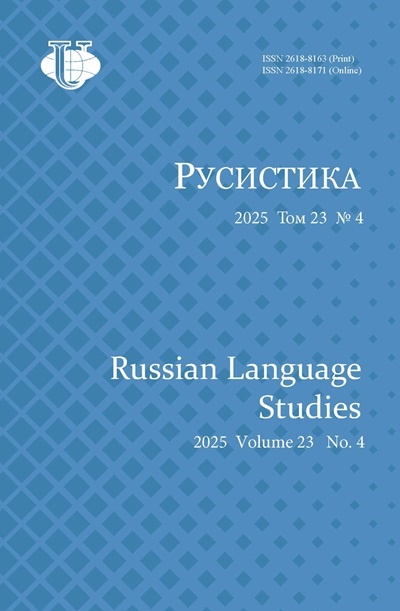Выпуск
Название
Авторы
|
Маслова В.А. |
|
Красильникова С.В., Ломакина О.В., Соколова Л.В. |
|
Комышкова А.Д. |
|
Владимирова Т.Е. |
|
Постовалова В.И. |
|
Патхан Х., Бакш И. |
|
Нгуен Н., Тхань Т. |
|
Хамраева Е.А., Шаповалов М.И., Ковтун Л.В. |
|
Никитина Т.Г., Панова И.А., Рогалёва Е.И. |
|
Антонова Ю.А. |
|
Мокиенко В.М. |
|
Иванов Е.Е. |
|
Дубинина Н.А., Птюшкин Д.В. |
|
Дзюба Е.В., Мушенко Е.В. |
|
Аль-Кайси А.Н., Гончар М.С. |
|
Сложеникина Ю.В., Растягаев А.В. |
|
Цю С. |
|
Москвичева С.А., Александрова О.И., Бруффартс Н.С. |
|
Фарисенкова Л.В., Желлали Э.И. |
|
Макарова В., Терехова Н. |
|
Григорьев А.В. |
|
Устинов А.Ю., Демешева Е.Н., Аббас Г.В. |
|
Вохмина Л.Л., Клобукова Л.П. |
|
Толстая А.Л. |
|
Боженкова Н.А., Негушина А.А., Боженкова Р.К. |
|
Кожевникова Е.В., Вязовская В.В., Трубчанинова М.Е. |
|
Пенчева А. |
|
Стрельчук Е.Н., Илихаму Ш. |
|
Алефиренко Н.Ф., Нуртазина М.Б., Шахпутова З.Х. |
|
Дьякова Т.А., Хворова Л.Е. |
|
Пашковская С.С. |
|
Дроздова О.Е. |
|
Спиридонов А.В. |
|
Цховребов А.С., Шамонина Г.Н. |
|
Пашковская С.С. |
|
Дмитриева Н.М., Просвиркина И.И. |
|
Матвеенко В.Э. |
|
Лумпова Л.Н., Рыжова Н.В. |
|
Недосугова А.Б. |
|
Млечко Т.П. |
|
Коврижкина Д.Г., Московкин Л.В. |
|
Хамшовски С.А. |
|
Мэн Л., Курьянович А.В., Цао Ж. |
|
Макарова В. |
|
Лапошина А.Н., Лебедева М.Ю. |
|
Маркова Е.М., Квапил Р. |
|
Баранова И.И., Чуваева К.М. |
|
Должикова А.В. |
|
Ликари К., Перотто М. |
|
Чжан В., Веснина Л.Е. |
|
Леппик С.А., Устинов А.Ю., Чабанец Т.А. |
|
Ююкин М.А. |
|
Богинская О.А. |
|
Шаклеин В.М., Ковтуненко И.В. |
|
Шаклеин В.М. |
|
Кульша Д.Н., Рябоконева О.В. |
|
Хайзер Ф. |
|
Величко А.В. |
|
Хромов С.С. |
|
Золотых Л.Г., Ельникова С.И., Космачева О.Ю. |
|
Федотова Н.Л., Бурцева А.В., Рыжкова И.В. |
|
Галимова Х.Н., Мартынова Е.В., Москвичева С.А. |
|
Жданова Е.А., Рацибурская Л.В. |
|
Мамонтов А.С., Богуславская В.В., Ратникова А.Г. |
|
Железнякова Е.А. |
|
Арынбаева Р.А., Маханова Ж.К., Дмитрюк Н.В. |
|
Лебедева М.Ю., У Д. |
|
Кожевникова М.Н., Хамраева Е.А., Кытина В.В. |
|
Никитина Т.Г., Рогалёва Е.И. |
|
Виноградова Е.Н., Клобукова Л.П. |
|
Загидуллина М.В., Киклевич А.К. |
|
Маслова В.А., Данич О.В. |
|
Краснокутская Н.В. |
|
Азимов Э.Г. |
|
Тарасова Н.И. |
|
Кураш С.Б. |
|
Шутова М.Н., Орехова И.А. |
|
Загоровская О.В., Бирюкова Е.Д. |
|
Николаенко С.В. |
|
Черкашина Т.Т., Новикова Н.С., Саенко Т.И. |
|
Воробьёв В.В. |
|
Клименко Е.Н. |
|
Звездина А.О. |
|
Логинова И.М. |
|
Носова В.В., Логинова И.М. |
|
Кротова Т.А. |
|
Сипан В.С. |
|
Козырева М.М. |
|
Василюк И.П. |
|
Константинова Л.А., Зубарева Ю.М. |
|
Музычук Т.Л. |
|
Замалетдинов Р.Р., Калинина Г.С., Зиннатуллина Г.Х. |
|
Карасик В.И., Шаклеин В.М. |
|
Воронин К.В., Исмаева Ф.Х., Данилов А.В. |
|
Сысоев П.В., Филатов Е.М. |
|
Денисенко В.Н., Сафаралиева Л.А., Перфильева Н.В. |
|
Боженкова Н.А., Рублева Е.В., Бахарлу Х. |
|
Чиршева Г.Н. |
|
Азимов Э.Г., Кулибина Н.В., Ван В. |
|
Жаппаркулова К.Н., Туйембаев Ж.К., Джолдасбекова Б.У. |











